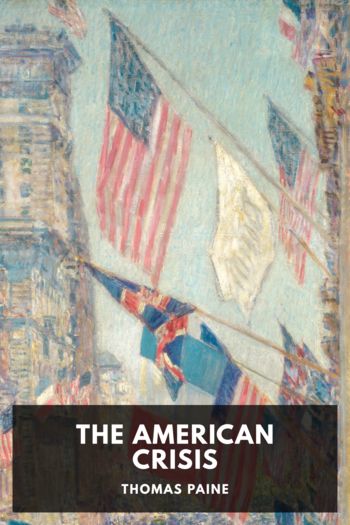The American Crisis, Thomas Paine [pdf to ebook reader TXT] 📗

- Author: Thomas Paine
Book online «The American Crisis, Thomas Paine [pdf to ebook reader TXT] 📗». Author Thomas Paine
When conquests are made of foreign countries, it is supposed that the commerce and dominion of the country which made them are extended. But this could neither be the object nor the consequence of the present war. You enjoyed the whole commerce before. It could receive no possible addition by a conquest, but on the contrary, must diminish as the inhabitants were reduced in numbers and wealth. You had the same dominion over the country which you used to have, and had no complaint to make against her for breach of any part of the contract between you or her, or contending against any established custom, commercial, political or territorial. The country and commerce were both your own when you began to conquer, in the same manner and form as they had been your own a hundred years before. Nations have sometimes been induced to make conquests for the sake of reducing the power of their enemies, or bringing it to a balance with their own. But this could be no part of your plan. No foreign authority was claimed here, neither was any such authority suspected by you, or acknowledged or imagined by us. What then, in the name of heaven, could you go to war for? Or what chance could you possibly have in the event, but either to hold the same country which you held before, and that in a much worse condition, or to lose, with an amazing expense, what you might have retained without a farthing of charges?
War never can be the interest of a trading nation, any more than quarrelling can be profitable to a man in business. But to make war with those who trade with us, is like setting a bulldog upon a customer at the shop-door. The least degree of common sense shows the madness of the latter, and it will apply with the same force of conviction to the former. Piratical nations, having neither commerce or commodities of their own to lose, may make war upon all the world, and lucratively find their account in it; but it is quite otherwise with Britain: for, besides the stoppage of trade in time of war, she exposes more of her own property to be lost, than she has the chance of taking from others. Some ministerial gentlemen in parliament have mentioned the greatness of her trade as an apology for the greatness of her loss. This is miserable politics indeed! Because it ought to have been given as a reason for her not engaging in a war at first. The coast of America commands the West India trade almost as effectually as the coast of Africa does that of the Straits; and England can no more carry on the former without the consent of America, than she can the latter without a Mediterranean pass.
In whatever light the war with America is considered upon commercial principles, it is evidently the interest of the people of England not to support it; and why it has been supported so long, against the clearest demonstrations of truth and national advantage, is, to me, and must be to all the reasonable world, a matter of astonishment. Perhaps it may be said that I live in America, and write this from interest. To this I reply, that my principle is universal. My attachment is to all the world, and not to any particular part, and if what I advance is right, no matter where or who it comes from. We have given the proclamation of your commissioners a currency in our newspapers, and I have no doubt you will give this a place in yours. To oblige and be obliged is fair.
Before I dismiss this part of my address, I shall mention one more circumstance in which I think the people of England have been equally mistaken: and then proceed to other matters.
There is such an idea existing in the world, as that of national honor, and this, falsely understood, is oftentimes the cause of war. In a Christian and philosophical sense, mankind seem to have stood still at individual civilization, and to retain as nations all the original rudeness of nature. Peace by treaty is only a cessation of violence for a reformation of sentiment. It is a substitute for a principle that is wanting and ever will be wanting till the idea of national honor be rightly understood. As individuals we profess ourselves Christians, but as nations we are heathens, Romans, and whatnot. I remember the late Admiral Saunders declaring in the House of Commons, and that in the time of peace, “That the city of Madrid laid in ashes was not a sufficient atonement for the Spaniards taking off the rudder of an English sloop of war.” I do not ask whether this is Christianity or morality, I ask whether it is decency? whether it is proper language for a nation to use? In private life we call it by the plain name of bullying, and the elevation of rank cannot alter its character. It is, I think, exceedingly easy to define what ought to be understood by national honor; for that which is the best character for an individual is the best character for a nation; and wherever the latter exceeds or falls beneath the former, there is a departure from the line of true greatness.
I have thrown out this observation with a design of applying it to Great Britain. Her ideas of national honor seem devoid of that benevolence of heart, that universal expansion of philanthropy, and that triumph over the





Comments (0)